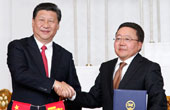$5 billion in loans offered to members of group
Updated: 2014-09-13 04:12
By ZHONG NAN (China Daily)
Comments Print Mail Large Medium SmallChina offered $5 billion in loans to other member states of the Shanghai Cooperation Organization for project financing, in a bid to provide them more flexible trade options, infrastructure facilities and security solutions to develop a regional economy.
President Xi Jinping urged SCO members to accelerate the pace of establishing an SCO financial institution to assist the regional trade of agricultural products, energy cooperation and scientific development.
“China will strengthen energy cooperation and security of oil and gas pipelines with SCO members, as well as diversify the trade of agricultural products between SCO members,” Xi said during the 14th meeting of the Council of Heads of State of the SCO, held in Dushanbe, Tajikistan, on Friday.
Xi said the SCO members should deepen energy cooperation at various stages such as production, transmission and processing.
The heads of SCO states at the meeting agreed to speed up establishment of an SCO development fund and bank, as well as deepen regional trade with one another.
China agreed in 2013 to establish a foundation for China-Eurasian economic cooperation that has drawn the participation of Asian and European countries including SCO member countries and observer countries. The initial phase of the foundation is $1 billion, mainly for infrastructure, regional connectivity, energy and agricultural development.
SCO members have already established two non-governmental organizations — the Business Council and the Interbank Association — to strengthen cooperation in the financial sector.
The SCO has targeted 2020 as the most important year for the free flow of goods, services, technology and capital among members.
China has proposed a number of measures to reach this goal, including allowing national currencies a higher international profile and getting banks in member states to adopt a more unified approach.
“The financial assistance will embody tangible efforts linking growth centers such as Beijing, Moscow and St. Petersburg, and developing new growth hubs such as Tashkent, Almaty and Dushanbe in the region,” said Sun Zhuangzhi, secretary-general of the SCO research center at the Chinese Academy of Social Sciences.
“From a long-term perspective, the economic cooperation will fully support trade, private investment, industrial productivity and service industry in this massive regional market,” said Sun.
China’s trade with other SCO members surged from $14.23 billion in 2002 to $129.45 billion last year, and China has proposed a series of strategic concepts, including the Silk Road economic belt. All six SCO members and the five observers are on the ancient Silk Road trade route.
Chen Yurong, a senior researcher at the China Institute of International Studies, said this is a practical step for SCO members to stimulate exports and gain foreign investment, especially the landlocked countries in Central Asia. They need effective channels to connect the European and Asia-Pacific regional markets.
zhongnan@chinadaily.com.cn
Big Talk






